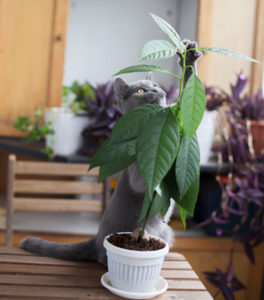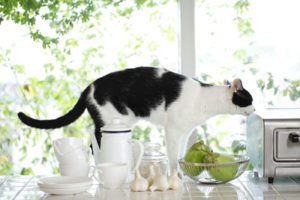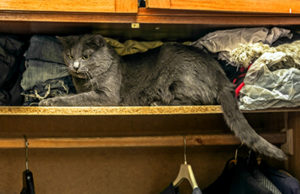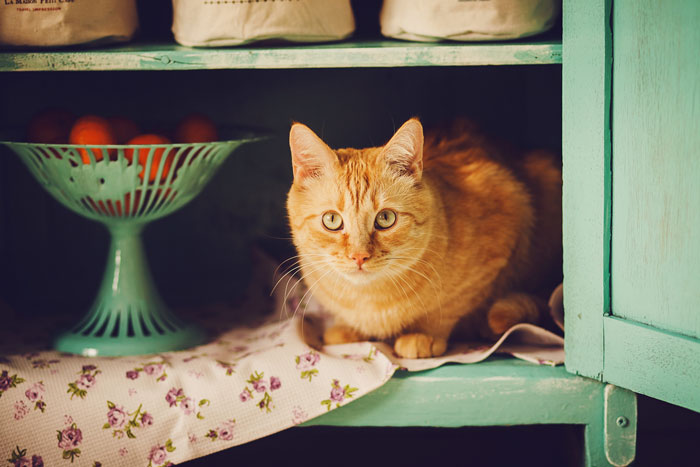From learning how to open child proof cabinets to leveling destruction on your bathroom, a rascally cat can quickly challenge your skill as a pet owner. Some unwanted behaviors may require a cat trainer’s help to fix, but with a little planning and insight of what your cat is capable of doing while you’re away, you can organize your home and protect Fluffy from herself.
Avoid Essential Oils

©Татьяна Кочкина/Adobe Stock
Cats have an exceptional sense of smell (14 times better than humans), which is why essential oils, scented candles and potpourri that are pleasant to you could be highly irritating to your feline. Strong smells can irritate a cat’s eyes, nose and throat, and could cause nausea, vomiting and respiratory distress.
Many essential oils are also hazardous to cats if they touch or ingest them and could cause a range of issues, including vomiting, low heart rate and/or body temperature, respiratory distress and liver failure. If you use a heated essential oil diffuser, your cat could also be severely burned if she gets too close to it.
If you use any essential oil or strongly scented item, you will need to watch your cat closely for any signs of distress. If she exhibits any, provide her with fresh air immediately and call your veterinarian. Never leave essential oils (or their diffusers) any place your cat might knock them over. You should store them in well-sealed bottle in an area your cat cannot reach.[1]
Keep Electrical Cords Out of Reach
Cats of all ages can be prone to gnawing on cords and cables—phone chargers, electrical and just about any type of wire within reach. Whether or not your cat likes to do this, you should make electrical cords as inaccessible as possible by keeping them off the floor and/or blocking an area, such as behind entertainment and computer systems. Cords that run along or across a floor can be protected by specialized covers (available at home improvement stores and online) or use cable clips to anchor them securely to a baseboard.
Check for Dangerous Plants

©stenli88/iStock
While cats are carnivores, many like to chew on greens every once in a while. This means your houseplants might be a tempting target. Make sure that all your indoor (and outdoor if applicable) plants are cat safe. The ASPCA’s website has extensive lists of toxic and nontoxic houseplants that can help you identify those that should be kept away from your felines. The organization also offers a downloadable app, APCC by ASPCA, that categorizes potential poisons by pet species and hazard type (plants, medications, foods, etc.). Ideally, you should remove all toxic plants and replace them with cat-safe ones. You could also create a special indoor kitty garden that your cats could safely nibble on. This will help satisfy their greens craving and help keep them away from toxic plants.
Block off the Laundry Area
Many people might not think a clothes dryer would be a hazard for cats; however, it can be lethal.[2] Cats love the enclosed space and warmth a dryer offers. Add warm clothes and the temptation to enter is even higher. To prevent the unthinkable from happening, the best thing you can do is to keep your cat out of the laundry are—keep the door closed at all time. If the dryer is in an open area, you could try screening or blocking it off. However, since cats are adept at going where they are not supposed to, you should always give the dryer one last check before turning it on.
Keep Counters Clutter Free

©kazoka303030/Adobe Stock
Some cats just can’t help themselves when it comes to knocking things off elevated surfaces. While this endearing habit can be wildly entertaining to felines and people, it can also pose a real danger to both—it only takes one broken vase to seriously damage a paw or foot. You should not leave breakable items on countertops, tables, or any shelves your cats might explore. Even if you have trained your cats to stay off of counters, it is always prudent to avoid presenting temptations. Chances are, you really don’t know what your cats are up to while you’re away.
Avoid Horizontal Window Blinds
Window blinds are another potential hazard to cats that no one really thinks about. Not only do the horizontal blinds create potential problems with cats getting stuck and panicking, but the cords are the true hazards. When cats play in window blinds, they can get easily caught up, thrash around in an attempt to get out, and choke to death as cords tighten around their necks. If you have these coverings, replace them with curtains, vertical blinds or single panel sun shields.
Close Cupboards & Closets

©dashabelozerova/Adobe Stock
Most cats love to climb into closets and cupboards, which is why you should always keep them closed securely. If your cat is a Houdini in reverse, you could install childproof locks on kitchen and bathroom cupboards to keep her out of them, particularly if they contain potentially hazardous items, such as cleaning supplies.
You should also make sure you store all medications, including vitamins and supplements, out of your cat’s reach. Lockable cabinets can go a long way to diverting even the most talented cat. If you happen to spill or drop a bottle of pills, make sure you hunt until the last one is found—even something as basic as acetaminophen or aspirin could cause liver failure in your cat.
Use Extreme Caution with Open Flames of Any Kind
Open flames are a danger to any home with pets. As skillful and beautiful as our cats may be, their tails could be their downfall. One brush against a candle could send your cat into a frenzy, resulting in a fire that spreads as quickly as your cat can run. If you have cats in your home, any open flame items should be placed in an area you cats cannot reach and should be closely monitored. Ideally, you should replace your traditional candles with battery-operated ones. Lastly, if you have a fireplace or wood-burning stove, it should be completely screened off to prevent your cat from getting to close and/or singed by escaping embers.
[1] Benson, K., DVM. (2018, January 12). Essential Oils and Cats. Retrieved January 16, 2018, from https://www.petpoisonhelpline.com/blog/essential-oils-cats/
[2] Sashin, D. (2010, April). 5 Risky Hiding Places for Cats. Retrieved January 16, 2018, from https://pets.webmd.com/cats/features/risky-hiding-places-for-cats#1
About the Author: Stacy Mantle is a fulltime freelance writer, bestselling author and founder of PetsWeekly.com. She resides in the deserts of the Southwest with a few dogs, several cats and a very understanding husband.





